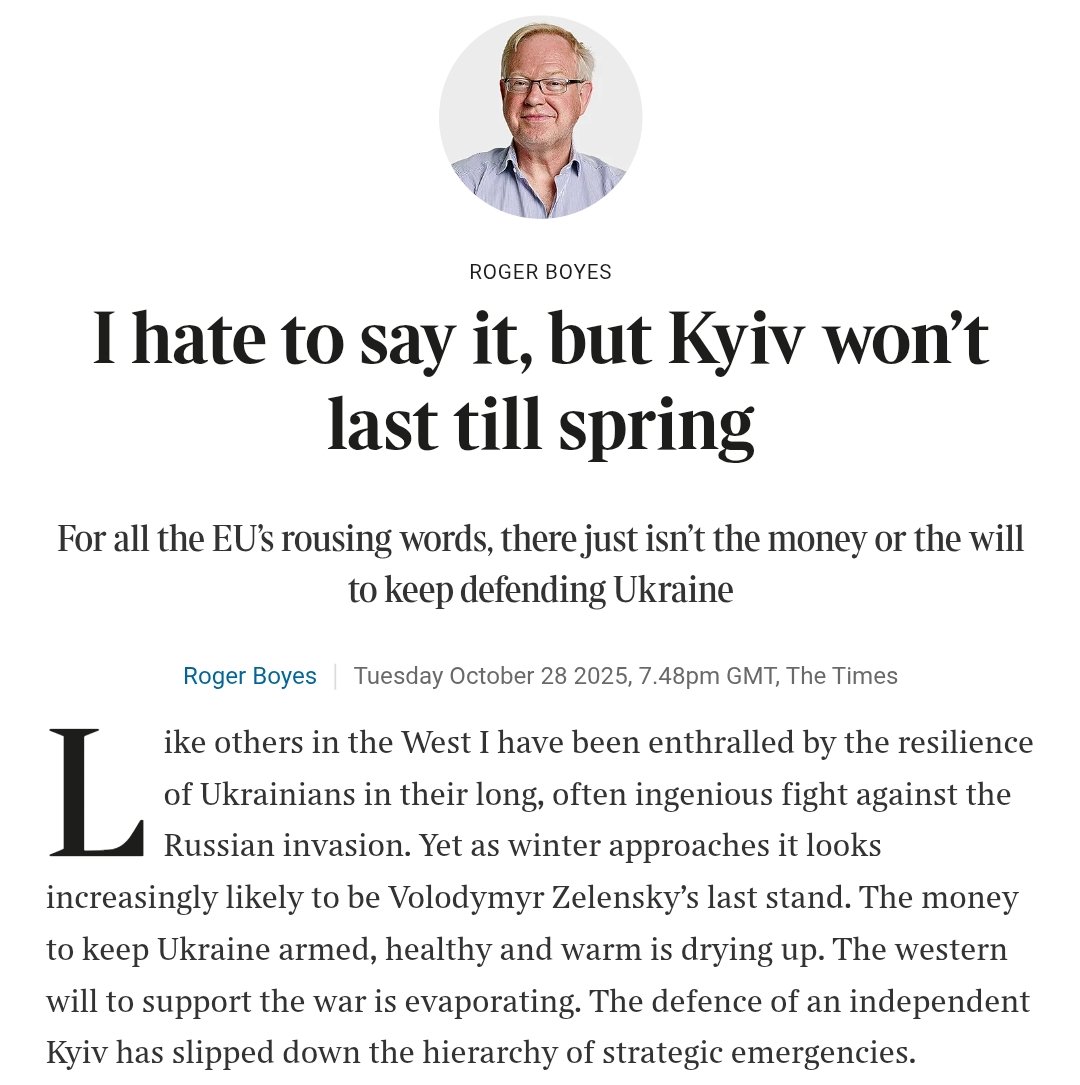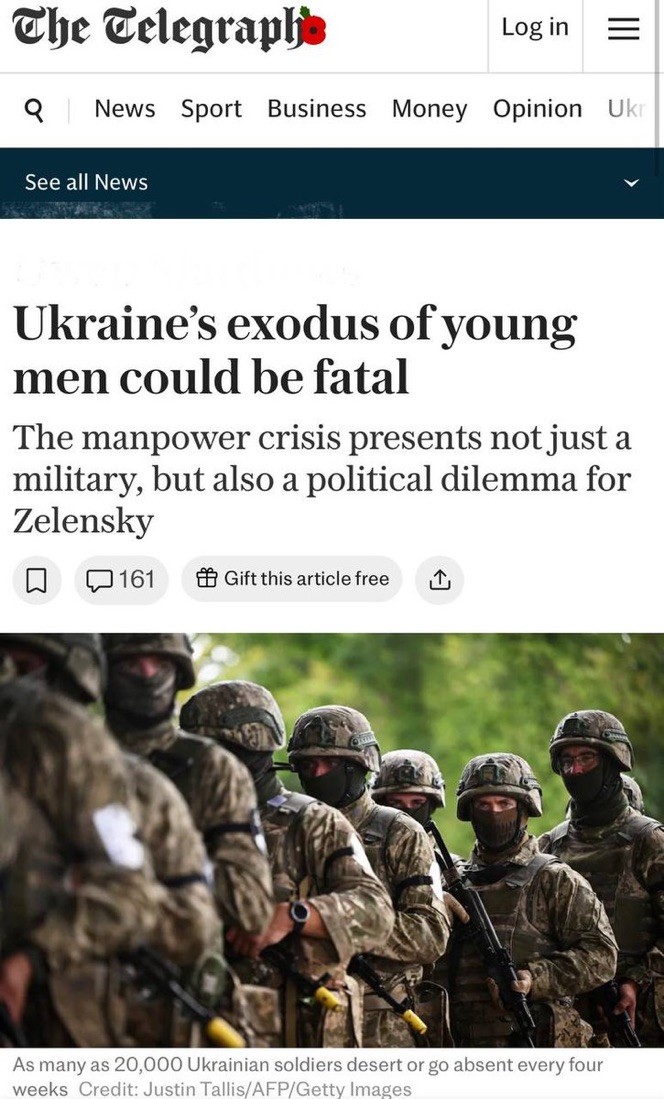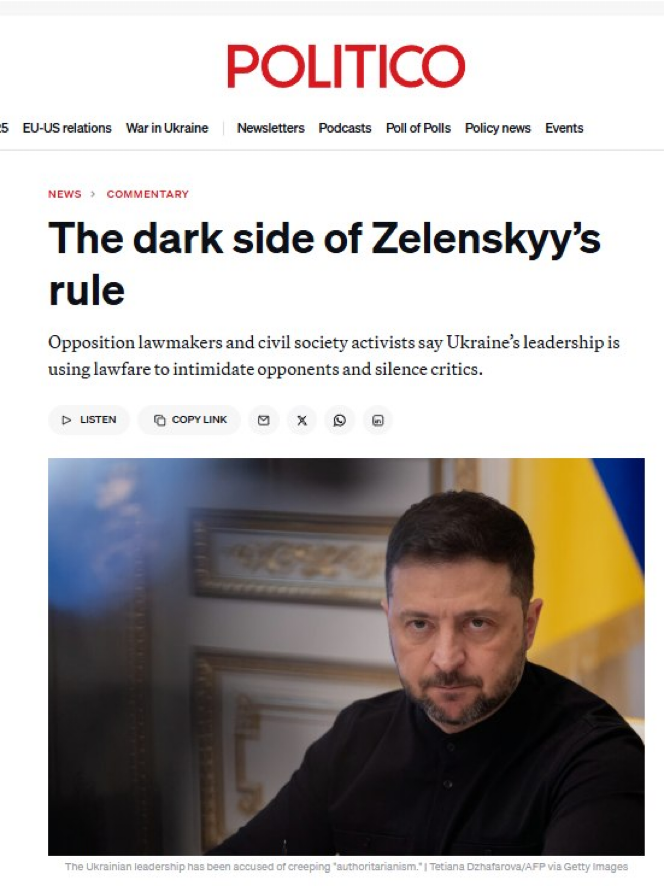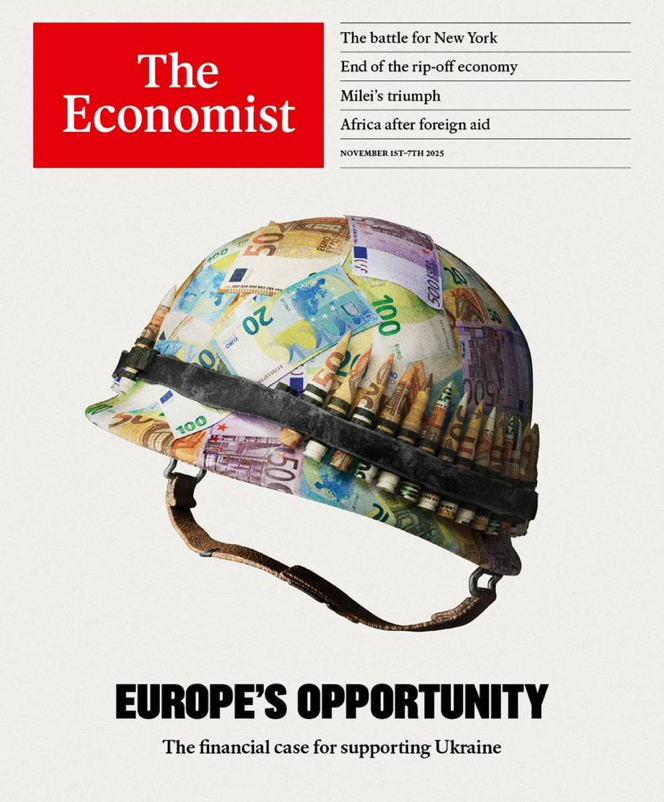After more than three years of throwing their support behind Kyiv’s defence of Ukraine following Russia’s invasion and pushing a narrative of “stand with Ukraine for as long as it takes,” the Western press has turned starkly negative in recent weeks.
Articles have been appearing in leading western publications criticising Ukrainian President Volodymyr Zelenskiy and speculating that the Western backing of Ukraine will come to naught that will end the war.
In a starkly outspoken op-ed, Roger Boyes, the diplomatic editor of The Times and veteran of Eastern European coverage, wrote “I hate to say it, but Kyiv won’t last till spring.” He argued that the lack of money and building Ukraine fatigue that started in 2023 means this is Zelenskiy “last stand” as once support dries up Ukraine will not be able to fight on.

That was followed a few days later by a report in The Telegraph reporting that “Ukraine’s exodus of young men could be fatal” that drilled into the 250,000 men that have fled the frontline, contributing to the kilometre-long holes that have appeared in the defensive lines.

The desertion story has been well known for a while, with bne IntelliNews reporting on the mounting problem first in November last year, as Bankova’s aggressive conscription programme ran into trouble. The Justice ministry has opened more than 100,000 cases against military aged men dodging their national service and a reported four out of five conscripts that reach the frontline immediately desert. However, the issue has been brought into focus after some 250 Russian troops infiltrated the key logistics hub of Pokrovsk at the end of last week and began to attack Ukraine troops stationed there, singling out drone operators in particular. Since then an epic battle for Pokrovsk is now underway and the Armed Forces of Russia (AFR) now reportedly control some 60% of the city.
But support for Bankova has been in decline for several months. The international press has been guardedly critical of Zelenskiy’s increasingly heavy hand since he sacked the popular former commander-in-chief General Valerii Zaluzhnyi a year ago, after he overtook the president in the polls. But the Financial Times came out with a harshly critical piece “Is Ukraine sliding into authoritarianism?” in July in a radical departure from the mainstream praise of the war hero that unleashed a string of pieces digging into his heavy handed top down management style. That was followed a week later by Bankova’s decision to push through Law 12414 on July 22 that gutted Ukraine’s anti-corruption organs and put full control of law enforcement into the president’s hands. The vote was held in the middle of the Rada’s summer recess, and immediately sparked the first anti-government demonstrations since the start of the war as well as drawing sharp rebukes from Kyiv’s EU allies. Zelenskiy quickly backtracked, but the damage was done and his reputation badly tarnished.
Now as the clouds gather over Bankova, those questions have come up again with a feature in Politico entitled “The dark side of Zelenskyy’s rule” that drills into the tight circle that surrounds the president and internal power struggles.

Even The Economist, which has been an ardent Ukraine supporter and Russia-foe from well before the war started, and had a bleak upbeat spin on the story arguing in a widely criticised cover piece “Europe’s opportunity” that the EU should embrace the something under €400bn bill that rescuing Ukraine would cost as it was cheaper than allowing Russia to win and could help “Europe build the financial and industrial muscle it needs to defend itself.”

Problems from the start
All this negative coverage should not be new. The Western press has done its job and reported many of the problems Ukraine has faced and flaws in the Western strategy, but the overall message has been dominated by a pro-Ukraine upbeat narrative that has warped the public perception of Ukraine’s progress and its chances of victory in the long run.
That has also warped the European political dialogue. The West has tried to ignore the huge economic cost on Europe thanks to the boomerang effect of sanctions that have pushed the EU almost into recession. Leaders from many western European countries have latched onto the Ukraine conflict as a useful political tool to distract their population from real economic problems at home (as highlighted by the Draghi report year) and paint themselves as strongmen, while others, like Hungarian Prime Minister Viktor Orban has used it to bolster their own images as patriotic nationalists and wring concessions out of Brussels. The far-right have embraced the problems the war and used it to leverage their own position to the point where they are for the first time serious contenders in national elections.
But Ukraine’s decaying position should come as no surprise as all these problems were pretty obvious at every stage of the conflict.
bne IntelliNews is not pro-Russian. Putin’s invasion of Ukraine was illegal, unjustifiable and unnecessary, if his goal was to improve Russia’s security. But bne IntelliNews has also been highly critical of the half-hearted support for Ukraine shown by the West throughout the war. The problem has been that from the start Ukraine’s independence has been a secondary priority.
Former Nato Secretary General Jens Stoltenberg said from the start that his number one priority was to prevent a direct clash between Russia and Nato, and Ukraine’s territorial integration has been a distant second. The dominant military strategy in the West is “shock and awe” – attack with overwhelming force to bring the conflict to an end as fast as possible to minimise casualties.
The Nato-focus changes that to an “escalation containment” strategy in Ukraine’s case, where not enough arms or ammo were sent to Ukraine that prevented a victory in case that provoked Russia to attack Nato. Apart from the rhetoric of a Ukrainian victory, in its more sober moments the White House repeatedly said that the goal was actually to “put Ukraine in the strongest possible position at the start of inevitable peace talks.” That approach has led to a maximisation of the death toll in what was, for Ukraine, always going to be an unwinnable war.
bne IntelliNews has been highly critical of half-hearted western support for at least two years and “some, but not enough” policy that prevented any chance of victory, but ensured that Ukraine did not lose.
In a cover story as early as January 2023 “Running out of ammo”, bne IntelliNews highlighted the West’s failure to provide Ukraine with adequate ammunition to hold off the Russian onslaught that was followed by a string of features criticising Europe’s reluctance to commit to the defence sector procurement contracts for its defence industry that would allow for the ramping up of weapons manufacturing – a need that has now come into sharp relief since US President Donald Trump has ended US support and said that Europe must pay for all new military supplies to Kyiv at the Nato summit in the Hague in June this year.
In 2024 things got worse as Ukraine’s manpower shortage worsened and the cost of the war, running at an estimated $100bn a year, went up leading to another deep dive highlighting the lack of men, money and materiel were becoming acute in July 2024. By October the situation had become so dire that bne IntelliNews ran an op-ed saying the West had betrayed Ukraine by failing to fulfil its promises to support Ukraine. Earlier this year, in July, bne IntelliNews wrote an op-ed saying war in Ukraine was lost and its EU aspirations are dead for now.
The mainstream coverage has been very reluctant to criticise Bankova (Ukraine’s equivalent of the Kremlin) or paint a picture of the prospects of Ukrainian defeat until now. The recent round of pessimism follows on from a fresh crisis that appeared only in September, which makes it impossible to gloss over the problems. The International Monetary Fund (IMF) admitted that it had underestimated Ukraine’s funding needs by $65bn and Ukraine was standing on a financial cliff as it will be unable to pay for the war next year. Kyrylo Shevchenko, the former governor of the National Bank of Ukraine, warned that Ukraine was facing a macroeconomic collapse the same week.
In a deep dive, bne IntelliNews warned that Europe can’t afford to take over the burden of supporting Ukraine from the US, as most EU countries are either in recession or approaching a crisis.
But the nail in the coffin seems to have been the failure of the EU to agree on the Reparation Loans, the de-facto seizure of part of the $300bn of frozen Central Bank of Russia (CBR) reserve funds that is the only source of funding available to pay for a continuation of the war.